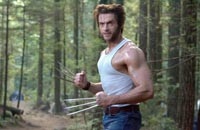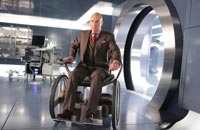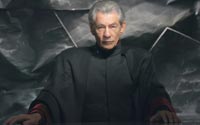Editor’s note: X-Men: The Last Stand opens in theaters this week, and we thought we’d take a closer look at these fascinating mutants—and what we might actually learn from them. This chapter is abridged from H. Michael Brewer’s book, Who Needs a Superhero?: Finding Virtue, Vice, and What’s Holy in the Comics (BakerBooks). The book is available at Christianbook.com.
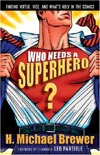 |
In 1963, Marvel giants Stan Lee and Jack Kirby created a new comic book series about a bunch of outsiders who never fit in: mutants, the children of the atomic age, born to parents genetically damaged by exposure to atmospheric radiation.
Thus were born the X-Men.
In the comic book version of genetic mutation, the mutant children invariably gain superhuman abilities, often at the cost of some physical oddity that sets them apart from others. The recurring theme in X-Men is alienation, the plight of people who are too different to fit in comfortably with the crowd.
X-Mythology
The mythology of the X-Men universe is simple. Normal human beings belong to the species Homo sapiens. Mutants represent the rise of a new species, Homo superior. Mutants have gifts that set them apart from others, and the world at large resents and even fears those mutant powers. This tension is the heart of the series.
In X-Men stories, frightened humanity expresses its escalating distrust in myriad ways. Mobs attack mutants who publicly display their powers. The U.S. Senate debates a mutant registration act. Monstrous robotic Sentinels scour the world on a mutant-extinction mission. In the nation of Genosha, mutants are tattooed, numbered, and sent to forced labor.
Being a mutant carries a heavy cost. Threading through years of individual stories is a larger saga about how mutants find different strategies for coming to terms with society. Mutants exist in this world, yet they exist apart from the prevailing culture. The mutant population must confront one fundamental and inescapable reality: They are in the world, but they are not of the world.
A World of Difference
The church has often described Christian experience in precisely the same manner: We are in the world but not of it.
Scripture describes us as foreigners far from our true home. Paul writes, “Our citizenship is in heaven” (Phil. 3:20).
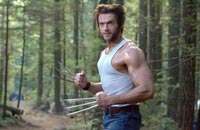
The church should issue a green card to the newly baptized, because Christians are definitely resident aliens. We have one foot in each world—earth and heaven—balanced precariously between living in the present and belonging to a world that awaits our homecoming.
Jesus never sugarcoated this tension: “If you belonged to the world,” he said, “it would love you as its own. As it is, you do not belong to the world, but I have chosen you out of the world. That is why the world hates you” (John 15:19).
Welcome, Christians, to the ranks of the misunderstood and the despised—the fellowship of those who are always in the world but never of the world.
Welcome to the church.
Welcome to the X-Men.
Living with Dual Citizenship
The X-Men provide uncanny parallels for Christians attempting to cope with a world to which we do not belong.
Like the church, Marvel’s misfit mutants don’t always agree on the best strategy for living in this tension. Overall, the X-Men explore four different ways of relating to the world—approaches the church has sometimes adopted too:
•peacefully coexisting with the world •attacking the world •compromising to fit into the world •withdrawing from the world
Although wheelchair bound, Charles Xavier, or Professor X, the founder of the X-Men, possesses the most gifted mutant brain on the planet.With his formidable psychic abilities, Xavier could exercise immense power over mere Homo sapiens.
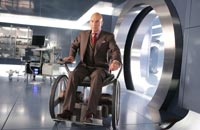
But Professor X has a different vision. He dreams of the day when humans and mutants can live beside one another in acceptance and mutual respect. To this end he’s established a school for mutants and gathered the original X-Men—starting with five teenagers with diverse powers: Scott Summers/Cyclops, Warren Worthington III/Angel, Bobby Drake/Ice Man, Hank McCoy/Beast, and Jean Grey/Marvel Girl.
Xavier recruited these remarkable teenagers so he could instill in them his philosophy of using mutant powers for the betterment and protection of humankind. Commentator Peter Sanderson describes the role of mutantkind in this way: “It was like the religious idea of the Elect, a specially blessed segment of humanity destined for greater things than the rest. … Charles Xavier taught his students to use their abilities to benefit humanity, even if the rest of humanity hated and distrusted them; Xavier was preaching the superhero genre’s version of Christ’s precept to turn the other cheek.”
Like Jesus, Professor X gathered disciples around him in hopes of creating a better world—where the strong defend the weak, unique powers are used for the common good, and differences are not only tolerated but celebrated.
Out of or Into the World?
Since the X-Men were trying to be agents of social change, it was inevitable that they would have to battle evil mutants who didn’t share Xavier’s dream. These mutant foes might be petty bank robbers who misused their powers for a quick buck or other adversaries driven by a dream in competition with Xavier’s.
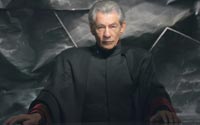
One such idealistic enemy is Magneto, born Erik Magnus Lehnsherr. Magneto, a complicated bundle of idealism, pragmatism, and contradictions, appeared in the first issue of X-Men and remains a persistent thorn in Xavier’s side to this day.
As a child, Lehnsherr had been imprisoned in the Auschwitz concentration camp, where his gypsy family died. After his magnetic powers awakened, Magneto became convinced that mutants were bound to suffer the same fate as the inmates of the Nazi death camps. Resolving to stop that persecution, Magneto declared war on the human race.
Xavier and Magneto had once been close friends, but their clashing ideologies turned them into enemies. And between the opposing poles of those ideologies, other mutants sought ways to fit into the world in spite of their differences.
A mutant named Polaris dyed her green hair a more natural shade so she could pass for a human. And Angel kept his wings a secret after they sprouted during puberty, harnessing them under his clothing.
But for some mutants, disguising themselves as normal people was impossible. Nightcrawler, with his dark blue fur, yellow eyes, pointy ears, three-fingered hands, and a tail, could never pass as a human—except by using an “image inducer,” which allowed him to cloak himself in a human image.
The problem with “passing” for human is that the mutant must deny his or her true nature. This particular compromise never lasts long. Either the secret gets out or the mutant tires of the pretense. Angel, for instance, eventually renounced his secret identity so he would never again have to hide his wings. Nightcrawler abandoned the image inducer after only a few months, deciding it was better to be himself in public without shame or deception.
The fourth strategy adopted by some mutants is a retreat from the world. If humanity hates us, they reason, we’ll drop out of sight.
Among mutants, the Morlocks, many of them misshapen and abused, made a home in abandoned tunnels beneath New York City. There, they lived in peace until they were discovered by a group called the Marauders, who attacked and killed many. The few surviving Morlocks withdrew still further from the world.
Christians as X-Men?
These four strategies mirror the ways Christians deal with the world.
Sometimes we are so intimidated by the opinions or prejudices of others that we find it easier to keep a tactful silence about our own beliefs. We don’t actually deny our faith, but by our silence we pass as people without Christian conviction or identity.
Or maybe we retreat from a culture that offends us—perhaps by pulling our children out of public school, or forbidding cable television in our homes.
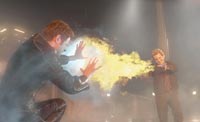
Magneto’s decision to make war on the culture may seem outlandish, but many Christians cultivate an attitude of us-versus-them, which can manifest itself in political action groups, boycotts, and pickets.
Charles Xavier’s dream of service and peaceful acceptance is an attractive vision for many Christians. Every time Christians help “outsiders,” we pursue peace for all. Soup kitchens, refugee adoption programs, jail visitations, and special offerings for the family who lost their home to a fire are typical ways Christians serve and love the world in the name of Christ.
I see strengths and drawbacks in each of these approaches.
Withdrawal protects our own holiness, and quiet compromise keeps the peace. But in either case we deprive the world of our witness. Jesus clearly calls us out of the world to follow him, but he also sends us into the world bearing his love.
Battling the world may help to build a more just and healthy society, but that approach can easily turns into a judgmental and arrogant attitude. Making enemies is easy; loving them is considerably harder.
Even Xavier’s approach of loving service has a serious shortcoming: He’s content with tolerance. He doesn’t try to make converts. How could he? Mutants are born; one can’t simply join the club. But mere coexistence falls short of Christianity’s calling. The church actively seeks to bring outsiders into the family.
Bridging Far-Flung Worlds
Comic fans love crossovers, meetings between characters from different books. The Avengers crossed over into X-Men #9, and the X-Men guest starred in Fantastic Four #28 and Avengers #53. Intra-company superhero encounters were a staple at Marvel, and crossovers remain commonplace, a guarantee of increased sales.
Far rarer are crossovers between characters from different companies. Once upon a time, DC was DC, Marvel was Marvel, and never the twain did meet. Then in 1976 DC and Marvel jointly released the oversized Superman vs. The Amazing Spider-Man. That landmark event brought together the flagship characters from each company and opened the way for future inter-company crossovers.
The X-Men have also crossed the great publishing divide, clashing with DC’s Teen Titans in a story with almost too many characters to track. An even stranger crossover brought X-Men into the Star Trek universe, where they came face-to-face with the crew of the USS Enterprise.
That encounter underscores why fans enjoy these comics so much. Crossovers between different companies represent a meeting between entirely different universes, the intersection of worlds that have never before touched. Characters have their eyes opened to possibilities and realities of which they’ve never dreamed.
Which brings up a fifth way for Christians to think about our relationship with people outside the church: a genuine crossover between different worlds.
Too often the church waits for “outsiders” to enter our reality. We publish a worship schedule and unlock the doors, as if the multitudes will come flooding in. Or we try to guilt others into joining us, stressing what’s wrong with them and what’s right with us. In ways both formal and informal, we insist that outsiders become like us before we make room for them. The implicit message is clear: We won’t set foot in your world; you’ll have to meet us in our world.

Instead of these dead-end approaches, maybe we should cross over to the world others live in. This doesn’t mean sacrificing our principles or compromising our integrity. In fact, an honest-to-goodness crossover requires being true to ourselves while according the same privilege to others. Unless we remain faithful to our calling, we have no story to share with others. On the other hand, unless we are willing to honestly listen to others, why should they listen to us?
When different worlds meet, fresh possibilities arise. New relationships are forged. Doors swing open to mutual trust and sharing.
In the comic books, crossovers almost always begin with misunderstanding and conflict. We should not be surprised if our efforts to cross over begin the same way. But beyond the initial friction is the possibility, even the likelihood, of friendship. Crossing over builds bridges, and bridges open a path into a new future.
Marvel’s mutants reveal the thorny challenge of being in the world yet not of it. Fearful mutants conceal their identities and seek a compromise. The purists withdraw and live in retreat. Some mutants draw the battle lines, while others strive for the separate races to coexist in peace. These mutant strategies echo similar courses Christians often choose.
Personally, I prefer the fifth possibility, a true crossover. Isn’t that what Jesus did? He crossed over from heaven to meet us where we live. He brought his world into ours—and while here, he crossed over social boundaries, over religious divisions, over the borders of economics, gender, race, morality, and politics. And he invites us to follow in his footsteps: “As the Father has sent me, I am sending you” (John 20:21).
Writing of the centuries-old division between Jews and Gentiles, Paul tells us those radically different cultures have found a meeting place in Christ. Jesus “has destroyed the barrier, the dividing wall of hostility,” so that he could “reconcile both of them to God through the cross” (Eph. 2:14, 16).
The sacrificial love of Jesus bridges far-flung worlds and connects every conceivable reality. That’s the ultimate crossover.
The X-Men did it. Can we?
Michael Brewer is an adjunct professor of religious studies at Northern Kentucky University. He is also a pastor at Crescent Springs Presbyterian Church, where he infuses his sermons with comic and cartoon mythology.
Used by permission of Baker Books, a division of Baker Publishing Group, copyright 2004. All rights to this material are reserved. Materials are not to be distributed to other Web locations for retrieval, published in other media, or mirrored at other sites without written permission from Baker Publishing Group.
Copyright © 2006 Christianity Today. Click for reprint information.

